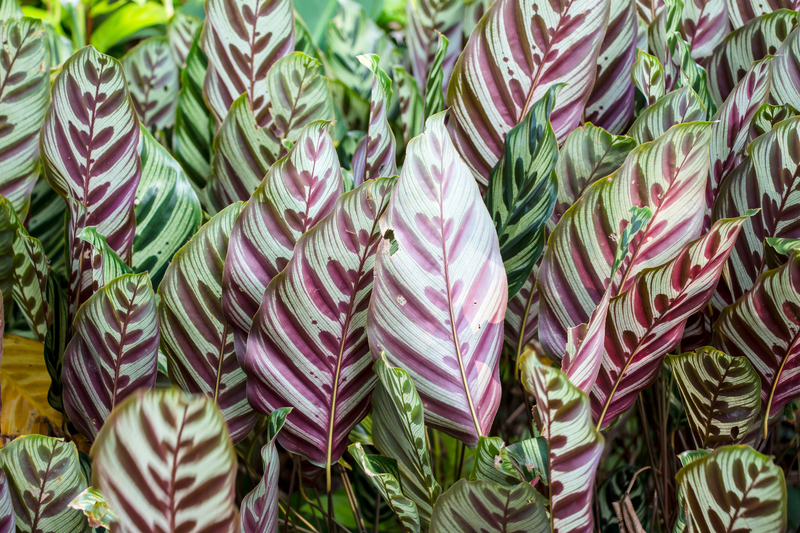From Garbage to Garden Greatness
Posted on 22/06/2025
From Garbage to Garden Greatness: Transforming Waste into Wonders
Every day, we throw away what we see as garbage. But what if that trash could be transformed into something remarkable--something that powers a thriving, beautiful garden? If you've ever dreamed of lush flowers, vibrant vegetables, and a sustainable lifestyle, you're not alone. Welcome to the journey from garbage to garden greatness--where composting, creative recycling, and eco-wisdom send your waste straight into the heart of your garden's success.

Why Transform Garbage into Garden Gold?
Turning household refuse into garden treasure isn't just trendy--it's essential. Landfills are filling up, pollution is a pressing problem, and food prices are rising. The solution? Upcycle your kitchen and yard waste to create a rich resource for your garden, dramatically reducing your environmental impact and boosting plant health. Taking your everyday garbage and converting it into garden greatness not only saves money, but it also empowers you to take the reins of your own sustainability.
Benefits of Going from Trash to Treasure in Your Garden
- Reduces landfill waste and keeps garbage out of the environment
- Enhances soil fertility with rich, natural nutrients
- Cuts costs on garden soil, mulch, and fertilizers
- Encourages biodiversity and supports pollinators
- Builds a sustainable lifestyle for you and your community
Composting: The Ultimate Garden Recycle System
The first step towards garden greatness is composting. Composting is nature's recycling program, turning food scraps and garden waste into a dark, crumbly, nutrient-rich material that plants crave. By mastering composting, you'll discover how compost can take ordinary garbage and create a garden goldmine right in your backyard.
How to Start a Compost System at Home
- Choose Your Compost Bin or Pile:
- Purchase a compost tumbler, stationary bin, or build a simple pile in a shaded spot
- Add the Right Ingredients:
- Greens: Vegetable peels, fruit scraps, coffee grounds, tea bags, fresh grass clippings
- Browns: Dry leaves, shredded newspaper, cardboard, sawdust
- Maintain Balance:
- Keep a roughly 2:1 ratio of browns to greens
- Turn and Moisturize:
- Turn the pile every two weeks and keep it as damp as a wrung-out sponge
- Harvest Your Compost:
- Compost is ready when it's dark, crumbly, and earthy smelling--usually after 3 to 6 months
Tip: Avoid adding meat, dairy, oily foods, or diseased plants, which can attract pests and create odors.
Beyond Composting: Creative Garbage-to-Garden Projects
Composting is just the beginning. Countless items commonly tossed in the trash can be repurposed to boost your garden's beauty and productivity. From plastic bottles to egg cartons, let's explore some inventive ways of achieving garden greatness with so-called 'junk'.
Ways to Upcycle Household Waste into Garden Tools and Features
- Plastic Bottles as Mini Greenhouses: Cut the bottoms off large plastic bottles and use them as cloches to protect seedlings from frost and pests.
- Egg Cartons for Seed Starters: Fill each cup with soil and a seed, then transplant when sprouts appear.
- Coffee Grounds as Fertilizer: Sprinkle used grounds around acid-loving plants to encourage growth.
- Old Newspapers Mulch: Lay down sheets around plants to suppress weeds and retain moisture.
- Wine Cork Garden Markers: Write plant names on corks, stick them on skewer sticks, and use in your beds.
Recycling Food Scraps for Garden Greatness
Not all kitchen garbage belongs in the compost bin--some scraps can be directly used to grow new plants or feed your garden:
- Regrow Green Onions, Lettuce, and More: Place the bases in water, watch them sprout, and transplant to soil for perpetual harvests.
- Banana Peels: Bury strips near roses and tomatoes--these slowly release potassium and phosphorus.
- Crushed Eggshells: Scatter them around plants to add calcium and deter slugs and snails.
- Stale Bread into Breadcrumbs: Dry and crumble, and use around thirsty plants as a mulch that slowly decomposes.
Vermiculture: Harnessing Worm Power
For those ready to take recycling to the next level, vermiculture--the practice of composting with worms--is a remarkable way to go from garbage to garden greatness indoors or out.
Red wiggler worms consume kitchen scraps and produce castings--one of the richest natural fertilizers available. Vermicomposting is perfect for urban gardeners, apartment dwellers, or anyone seeking to minimize their garbage footprint.
How to Set Up a Worm Bin for Home Composting
- Choose a large opaque plastic bin with a lid and drill several ventilation holes.
- Add bedding from shredded newspaper and dampen it lightly.
- Introduce your red wiggler worms (available online or from local farms).
- Feed the worms kitchen scraps (avoiding citrus, onions, dairy, and meat).
- Harvest worm castings every few months for use as a potent plant food.
Garden Greatness: How Waste-Enriched Soil Transforms Your Plants
So what magic unfolds when garbage is upcycled and composted in your garden? The benefits are nothing short of spectacular.
- Stronger Roots and Healthier Yields: Compost improves soil structure, drainage, and aeration, allowing roots to flourish and crops to thrive.
- Boosted Microbial Activity: Organic matter supports beneficial microbes that break down nutrients for plant uptake.
- Sustainable Soil Enrichment: Stops the cycle of chemical fertilizer dependence, building lasting garden fertility.
- Fewer Plant Diseases: A diverse, healthy soil microbiome fends off many pests and illnesses naturally.
Success Stories: From Trash to Blooming Triumph
Across the world, eco-savvy gardeners are embracing the transformation from trash to garden greatness. Whether it's a school turning cafeteria waste into abundant vegetable beds or a community garden fertilized with neighborhood food scraps, the outcomes are inspiring:
- Yield increases of 30-80% thanks to compost-enriched soils
- Reduction in garbage collection fees and landfill usage
- New wildlife habitats in urban spaces, from pollinators to birds
- Stronger, tastier food crops and more resilient ornamental plants
Tips for Maintaining Your Garbage- to-Greatness Garden
- Keep a compost caddy in your kitchen for easy scrap collection.
- Avoid glossy or colored paper, as inks may contain toxins.
- Shred cardboard boxes before composting to speed decomposition.
- Monitor moisture in bins; too wet or too dry will slow the process and create odors.
- Rotate crops annually to prevent soil depletion and disease buildup.
Eco-Friendly Upgrades: Reducing Household Waste Beyond the Garden
Garden greatness goes hand-in-hand with smart waste minimization elsewhere in life. Consider adopting these green habits:
- Invest in reusable grocery bags, produce bags, and containers to cut plastic waste
- Switch to bulk purchases and avoid over-packaged foods
- Support local recycling programs and donate tools or containers when replacing them
- Get creative--upcycle old tires as planters or create wind chimes from tin cans

The Future: From Waste Challenge to Green Opportunity
Turning garbage into garden treasures isn't just a trend--it's the future of eco-conscious living. Scientists, urban planners, and gardeners are developing innovative ways to harness organic waste for rooftop gardens, regenerative farms, and climate-resilient cityscapes. Each bag of kitchen garbage diverted from the landfill means less methane emissions, healthier food, and a more sustainable world for future generations.
By embracing this mindset, every gardener--urban or rural--can do their part. The power to create a greener, more abundant world is in our hands (and our compost pails).
Getting Started: Your Journey from Garbage to Garden Greatness
Ready to dig in? Begin with just one change--such as starting a compost pile or using kitchen scraps as fertilizer. Gradually, incorporate more waste-reducing habits and experiment with new upcycling ideas in your garden. Over time, you'll witness a wonderful transformation--not just in your plants, but in your relationship to the planet.
- Start collecting compostable kitchen and yard waste today
- Research which upcycled garden features fit your space best
- Share your progress with neighbors and inspire your community
Conclusion: Garbage to Garden Greatness is Within Reach
The path to garden greatness through waste transformation is exciting, impactful, and full of innovation. Every banana peel, eggshell, and discarded bottle becomes a stepping stone toward a more bountiful and eco-friendly life.
So, are you ready to step up? Compost, recycle, upcycle, and watch your garden thrive--powered by the things you once tossed away. The journey from garbage to garden greatness starts now. Your thriving, sustainable oasis is only one scrap away!
Further Reading and Resources
Latest Posts
Elevate your landscape with nine fast-growing privacy hedges
Garden Green, Breathe Clean: Combatting Climate Change
From Chaos to Calm: Mapping Your Garden Revival
Transform Your Garden into a Zen Paradise for Ultimate Relaxation

